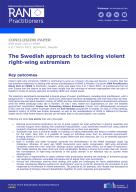Details
- Publication date
- 28 June 2023
- Author
- Directorate-General for Migration and Home Affairs
- Country
- Sweden
- RAN Publications Topic
- (Early) prevention
- Deradicalisation/disengagement and exit work
- Formers
- Multi-agency cooperation
- Violent right-wing extremism
Description
Violent right-wing extremism (VRWE) is continuing to grow as a threat in Europe and beyond. A country that has had extensive experience in dealing with various manifestations of VRWE is Sweden. During the RAN Practitioners Study Visit on VRWE to Stockholm, Sweden, which took place from 6 to 7 March 2023, 14 practitioners from all over Europe had the chance to gain first-hand insight into the workings of several organisations that are part of Sweden’s whole-of-society approach to tackling VRWE and related issues.
The meeting’s participants represented a diverse group of expert practitioners, including local practitioners, with a background in — among other areas — social work, alternative narrative campaigning, exit work and prison services. Participants learned about Sweden’s history of VRWE and how international and geopolitical developments influence what the VRWE landscape looks like in Sweden. On Day I they visited two organisations on site: the Swedish government organisation Center for Preventing Violent Extremism (Center mot våldsbejakande extremism (CVE)) and the youth centre Fryshuset where the Exit Sweden programme is located. On Day II of the meeting, Sweden’s history of VRWE was further discussed, as well as the manifestations of VRWE in different EU Member States and to what extent lessons learned can be taken back to the participants’ own context.
Following are some key points that were discussed.
- National governmental institutions can be of great support for local authorities in sharing expertise and concrete support when dealing with (potential) radicalisation. Local authorities benefit from using national (support) structures instead of having to completely set up their own approach.
- Successful exit work is primarily based on building a trusting relationship and being a credible messenger for the client. Only then is it possible to nudge an individual away from an extremist environment. Bringing clients out of their comfort zone usually takes time and resources, but it is an essential approach to create change.
- Both in Sweden and other European countries the diversification of the VRWE landscape poses big challenges. Whereas 10 years ago VRWE movements were easily recognisable, right-wing extremists nowadays create their own ‘salad bar’ ideology and/or radicalise mostly online, out of sight of institutions. This makes tackling the issue more and more complicated. Building a strong civil society that can counter the normalisation of right-wing narratives in the public domain is an essential way to counter these developments.
- Media have a responsibility to assess whether their productions showing the workings of extremist groups can negatively influence vulnerable individuals and to adjust their work accordingly.
- Privacy and information sharing when dealing with cases are challenging for many stakeholders across Europe. Developing effective systems for practitioners’ work is crucial for advancing the prevention of and responses to involvement in violent extremism. The practice of, for example, Info-houses was discussed as an example of bringing relevant stakeholders together for joint responses and approaches.
- Practitioners emphasise the similarity and overlap with adjacent fields (e.g. discrimination, hate speech, gender-based violence) and stress the importance of learning from and utilising already existing systems and approaches in adjacent fields when dealing with VRWE.
This paper begins with a short history of (violent) right-wing extremist groups in Sweden. Then, the approaches of the two organisations and their place in the Swedish national approach are explained, based on the presentations provided during the study visit. Lastly, the highlights of the discussion are formulated, as well as a way forward.

